Interview With a Dead Director
By Stuart J. Kobak
"Of course we had our techniques," John Ford went on to say,
"and we had directors that focused on that, but the fact is the characters and the
story came first. A lot of these young folks today, they have so much of this technology
thing going for them they forget to make a movie, tell a story, create a world."
I had the sense that underneath the patch on his left eye, some sort of
second sight was fulminating. Grizzled and tough, there was a lyrical quality to the style
in which the master director held court. The fact that he had been dead for more then
twenty years, however, proved disconcerting at times. 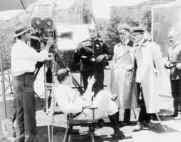
John Ford in the Director's chair
When I asked him what it was like to be dead, the reality, or rather
unreality of the situation gave me pause, but this was an opportunity I couldn't let slip,
sitting here in the most casual of situations discoursing on film with one of cinema's
true legends. "Dead," he said. "What's dead? Dead is when you've been
making movies all your life and suddenly they-the mean spirited guys with the money, I
mean-tell you can't make movies any more. That's dead. And the truth is maybe they're
right. That's really dead. You can call the state I'm in now anything you like, Sonny, but
I can drink as much as I want and I don't get drunk, I don't even get tired and I don't
have that damning desire to do what I can't do anymore. So whatever you call it, it ain't
so bad."
I realized he had been swirling the ice cubes in his glass round and
round as he talked, punctuating each sentence with a huge gulp of whiskey and though we
had been sitting like this for some time now, it was true, the liquor had virtually no
effect on him. Despite the frequent tilts of the glass, the level remained mostly full. I
never did get an explanation for the bottomless glass. He wore a black baseball cap ,the
title The Alamo burnished across the front in gold, pulled tightly on his head even though
we were indoors. As I watched Ford, I realized he was sitting on a director's chair in
front of my eleven foot wide projection screen. I was tempted to slide a laser of The
Searchers into the Pioneer CLD95 and crank up the Sony 1251 Projector to throw an image of
this great film right onto Ford in front of the screen. The fact that this was happening
where I shared so many moments created by this great director was fitting. He sat there
waiting, drink in one hand and a handkerchief in the other, occasionally biting at a
corner of the handkerchief between swigs of booze.
I mentioned to Ford that there seemed to be a resurgent interest in the
Western and 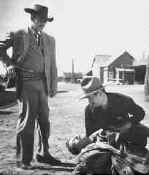
Henry Fonda as Wyatt Earp in My Darling Clementine with Ward Bond standing.
that two films were released recently retelling the Wyatt Earp legend,
just as Ford has approached the Earp legend on screen in the 1946 film My Darling
Clementine. I was shocked by his knowledgeable response. "I'm familiar with those
attempts. I can't say I cared for either. One, Tombstone, just didn't know where it wanted
to go, whether it was a shoot-em-up or a comedy. I suppose it was fun. Yeah, that kid Val
Kilmer was a pretty funny Doc Holiday and Russell wasn't a bad Earp. Sincere anyway. Did
you notice that scene in the film when Russell sits on the porch in front of the
jailhouse, chair tilted back and legs rocking against he hitching rail. By God that came
right from "Clementine." Fonda did the same exact thing. I gotta believe he
watched that scene and tried for it. As for the other film, it was just so damned boring.
The pacing was all wrong. It just ruined the film. There was a lot of good detail and I
like Costner. There's a quality about him that reminds me of Fonda. Innocence, I suppose.
But the director, Kasdan, just couldn't get it right. Nice Holiday from Dennis Quaid.
Interesting."
I asked Ford how and where he happened to see those films considering
that he now resided on the other side of reality. "I didn't just go to a movie
theater and see them. In a sense, I didn't sit through them at all, not in the way you
understand. You see, there's a sort of collective knowledge that's available here and
there are things you just know. I know those movies, okay."
Since he brought up the names of some contemporary actors, I pumped him
for his feelings about the actors he worked with on his films. "I made more than a
few films with the Duke-John Wayne, you know-and he wasn't bad at all. He was a very
physical actor owing a great deal to his enormous size. Ate a bit too much and pulled on
the bottle pretty good." John Ford directed his favorite friend in 13 starring roles.
"I can't say he was the best actor. He did what he did well and given the right
material, the Duke could blow you away, believe me. But I directed some of the best men in
Hollywood. Fonda, Spencer Tracy, Eddie Robinson, Cooper, Ty Power, Gable, Jimmy Stewart
and that son-of-a-gun Cagney. All great actors. Fonda was something special. He had those
eyes. Luminous. They picked up the Kliegs. Big eyes, kinda watery. As a director, I got so
much out of those eyes."
When I asked Ford to give me the lowdown on Fonda and Mr.
Roberts he nearly toppled the director's chair over as he sprung to his feet." I hit
the piddling son-of-a-bitch, that's what happened. He couldn't get a god-damned job in the
movies no how and I fight the money grabbers to get him the role and he's telling me how
to direct all of a sudden. Damn those eyes. Fonda wanted to work for me, he should've let
me direct. There's only one director on the set and if his word isn't gospel, its chaos. I
shouldn't have hit him though. I tried to apologize, but he didn't want to know from
it." Fonda had this to say about Ford "He had an instinctively beautiful eye for
the camera. But he was also an egomaniac." Ford never did finish directing Mister
Roberts. A gall bladder attack exacerbated by the heavy drinking landed him in the
hospital and Mervyn Leroy was brought in by Warner Brothers to complete the film.
Unfortunately, Mister Roberts still has not been released on laser.
Taking several quick gulps from the glass seemed to calm Ford down and
he continued talking in less emphatic terms. "I don't think there's any possibility
of my being thought of as a woman's director, but I had some good ladies in front of my
camera. Claudette Colbert, she was a pro. I like that film Drums Along the Mohawk. She and
Hank Fonda were real good in it. And I had Grace Kelly and Ava Gardner 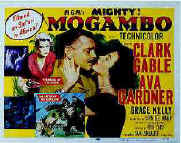 together in
Mogambo clambering after Gable. Shirley Temple was a doll. I directed her twice. She was
terrific when she was a little one in Wee Willie WInkie. She lost something coming into
womanhood. Still, I liked her in Fort Apache. You know who was a good little actress. Vera
Miles. Underrated that girl. And Jeannie Arthur was another pip of an actress in The Whole
Town's Talking."(Another Ford title missing from the laser catalog.)
together in
Mogambo clambering after Gable. Shirley Temple was a doll. I directed her twice. She was
terrific when she was a little one in Wee Willie WInkie. She lost something coming into
womanhood. Still, I liked her in Fort Apache. You know who was a good little actress. Vera
Miles. Underrated that girl. And Jeannie Arthur was another pip of an actress in The Whole
Town's Talking."(Another Ford title missing from the laser catalog.)
I noted to Ford that he didn't even mention Maureen O'Hara whom he had
cast in five films. "I used her because she was right for the roles, but don't kid
yourself, she was no sweetheart on the set. She didn't like me and I didn't like her. I
liked her with the Duke though. Anyway, I didn't have to go home with her. "
"Making movies, it was great. It was like having this big, extended
family around you. The Westerns were especially fun. Out there on location. The stars in
that desert sky, they beat the stars and stench of Hollywood. Good beef on the grill, some
music and somebody always had a grand tale to tell. We didn't talk film at night. It was
off limits. We played games, dominoes, poker. Or maybe Danny Borzage would strike up a
tune on the accordion and we'd sing. He was the director Frank Borzage's brother. The
camaraderie was special. I always tended to use the same actors as much as possible. It
was easy for the supporting roles. What a pleasure. You know what you were going to get
from them. They knew what you wanted. I had my buddy Ward Bond and my brother Francis, big
"Vic the Mick " McLauglhin. I see them now whenever I want now and we throw back
the brews."
I told Ford, "You made a lot of terrific Westerns. Two of my
favorite movies are Ford Westerns. The Searchers and My Darling Clementine. But I am sure
that this episode with you was instigated by my recently viewing the laser disc of How
Green Was My Valley. There is so much love in that film. The coal mining village is an
exquisite set. It's a stirring film about family and the strength of man to endure." 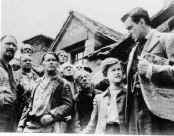
Walter Pidgeon and Roddy McDowell in How Green Was My Valley
Ford turned his head slightly, his profile suddenly a shadow against the
large white screen. The room was extremely quiet. Only moments passed, but it seemed
longer. Images from How Green Was My Valley entered my mind. I saw Walter Pidgeon and
Roddy MacDowall on the hill overlooking the village, then the men trooping from the mines,
singing, swinging there arms after the day of labor. The director too must have been
seeing visions of that beautiful film. When he turned back to face me, behind the glasses
and the gruff exterior of a hard drinking man, I thought I could detect a tear." I
love that film myself," he said. I love that family. Donald Crisp was just great as
old man Morgan. He got the Academy Award for Best Supporting Actor. And the kid,
Roddy,
was simply amazing as Huw Morgan. It wasn't the sort of performance you could expect from
a kid. I think he just turned thirteen during the filming. A lot of the success of that
film centered around Roddy's performance." Ford didn't mention that he himself won
Best Director from the Academy for the film and it won a total of five Oscars for its ten
nominations.
"When was the last time you saw The Grapes of Wrath," I asked
the director. "Anytime I want. It's all up here. Every frame. Every syllable. Right
up here," he said, tapping the top of his head. "Prerogative of my state of
being, you might say." 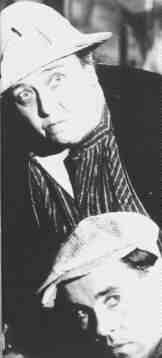
Fonda and Darwell in Grapes of Wrath
I told him that after seeing his magnificent Welsh depiction of
family, hardship and the strength of man, I couldn't help wanting to see his look at
America in the throes of similar circumstances. The laser disc of "Grapes"
didn't look nearly as good as "Valley." Much of the exemplary lighting
techniques of cinematographer Greg Tolland lost the impact the original film must have
had. Ford was dismayed at my observation concerning the condition of the transfer print of
The Grapes of Wrath. "Sad. Tolland shot that so beautifully. had a lot of dark scenes
lit by candles or kerosene lamps. We lit the faces with a luminescence that almost lent
them an ethereal quality. Very special. I don't understand it at all how an industry could
fail to protect the gold pile it built up. It wouldn't have happened had they had these
laser things, I'll tell you. They would have had the money machine putting movies on your
shiny discs and they'd be perfect forever." 1
Since the subject of lighting came up, I mentioned to Ford that although
he worked with a lot of different cameramen, there is still a sense of unity to the look
of many of his films. "MacDonald was simply fantastic on My Darling Clementine,"
Ford enthused. " Is that on laser? How's it look?" He was pleased when I advised
him how splendidly it fared on the rainbow disc." Just because you make the ultimate
decisions, it doesn't mean you don't take advantage of the talent you're lucky enough to
group around you. Tolland gave me great work on The Long Voyage Home. Stunning high key
photography. Mind you, it was what I wanted.
"Maybe my films have that look because I didn't move the camera
more than I had to. Take a look at the last few set-ups in The Searchers. Winton Hoch did
a majestic job of shooting that film for me. You got crazy old Mose Harper rocking on the
porch. That was a great role for Hank Worden. I think he made seven or eight movies with
me. The camera's still. The movement comes from him. Next there's a shot from the
perspective of the house. Ethan Edwards is carrying Debbie, delivering her to Martha and
Aaron. Again, the camera is stationery as Edwards approaches. He reaches the porch, puts
her down, Debbie embraces her mother and then I pull the camera back slowly framing the
doorway in a black border. Still the same shot. Almost all the movement is generated by
the characters. Edwards turns and walks off to loneliness. The only reason for the camera
movement was to avoid another set-up and create a new frame without breaking the power of
the emotions." 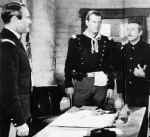
Fonda and Wayne in Fort Apache
Ford was getting fidgety. The frequency of gulps continued to increase.
Still, the glass maintained its level. I sensed frustration from Ford. I pressed on and
asked about fellow directors that he admired. "I like Raoul Walsh a lot, probably
because he wore an eye patch. You can't ignore Griffith. Everyone owes a debt to him. Bill
Wellman knew where to put the camera. Yeah, and Capra. He was a great story teller. Had a
heart. He had his fingers on the pulse beat of his audience too and don't short change
that ability. Hawks too. You gotta count Hawks in there."
Contemporary cinema was another matter. "There is too damn much
gratuitous violence. The more blood, the more box office and there are talented guys out
there succumbing to the basest instincts. Don't get me wrong. The last thing I believe in
is censorship. I just hate to see the quality of story telling go downhill. And all these
camera cuties. You got something to say by using the camera in a distinctive way, fine.
But when it strutting like a peacock in heat, you take away from the story. Most times,
with the camera certainly, less is more.
"Listen, kid. I can't seem to empty this glass, I can't seem to get
drunk, and there are a few other things I can't do anymore. And if I stay here much longer
with I might just go nuts. I'm out of here. Lasers, huh." Before I had a chance to
utter another breath, there was no Ford, the big screen wasn't in front of me and the
covers on my bed were draped halfway on me and halfway on the floor as a sliver of light
streamed in through the window across my eyes forcing me to blink awake.
The
Feature
Archive has articles
ranging from John
Ford to Blonde
Bimbos, The
Heistmasters and Frank
Darabont.
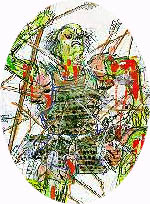
Click on the image above for as original view of Akira
Kurosawa's work.
Check out the Movie
Poster Archive for short bios and images of
Susan Hayward, Kirk Douglas, Katharine Hepburn and many more.
This month's featured star is Clark
Gable.
Check out the Movie
Poster Archive for short bios and images of
Susan Hayward, Kirk Douglas, Katharine Hepburn and many more.
This month's featured star is Clark
Gable.
Check out the Movie
Poster Archive
for short bios and images of Susan Hayward, Kirk Douglas,
Katharine Hepburn and many more. This month's featured star
is Clark
Gable.

Imaging
Science Foundation
promotes proper standards in home theater viewing. ISF trained
technicians offer monitor calibration services to consumers. The
difference in a properly calibrated monitor can be
astounding. Click on the image to find an ISF member near you.
Home
Theater Reference Reviewing System
When you read a DVD review it's of utmost importance to know
what equipment is being used to evaluate quality. Click on the
projectors to find out more.
HOT
LINKS
DVD
Verdict
They
may be judgmental, but that's the point, isn't it. Lots of DVD
reviews plus news and more
The
Home Theater Forum
Looking for
lively and helpful exchanges on home theater, DVD, movies. Visit
this friendly site and get a hardy welcome.